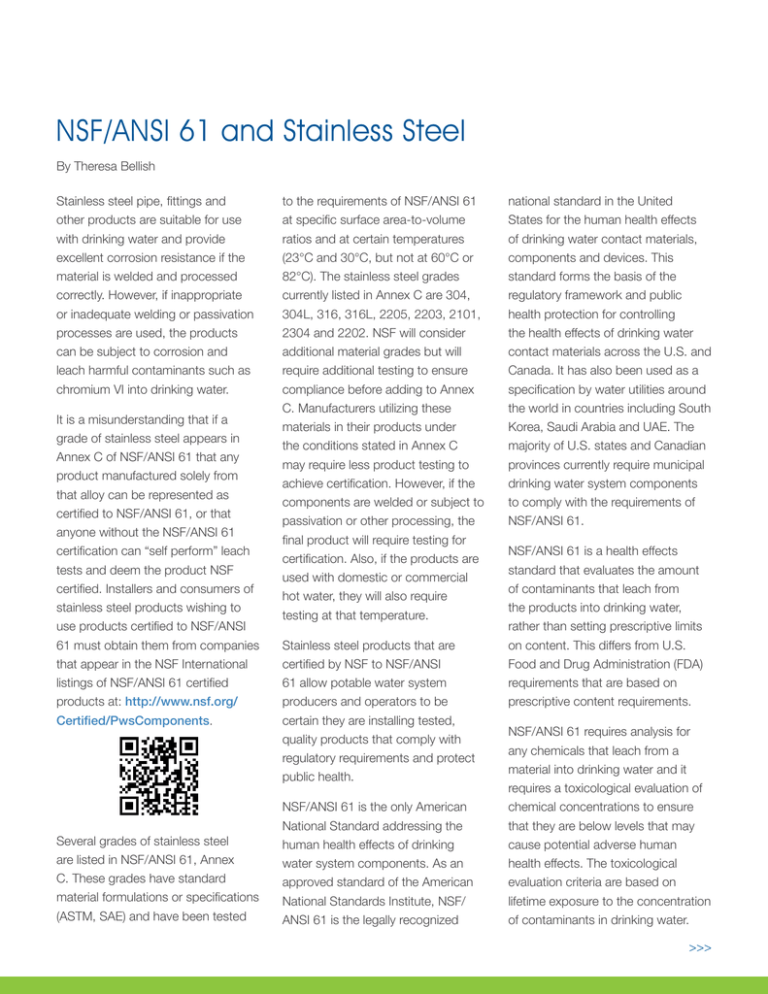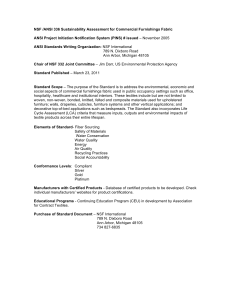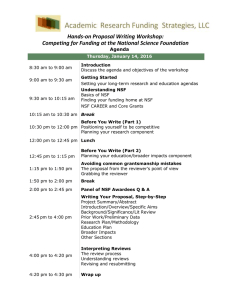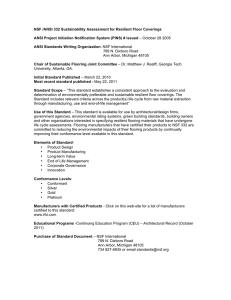NSF/ANSI 61 and Stainless Steel
advertisement

NSF/ANSI 61 and Stainless Steel By Theresa Bellish Stainless steel pipe, fittings and other products are suitable for use with drinking water and provide excellent corrosion resistance if the material is welded and processed correctly. However, if inappropriate or inadequate welding or passivation processes are used, the products can be subject to corrosion and leach harmful contaminants such as chromium VI into drinking water. It is a misunderstanding that if a grade of stainless steel appears in Annex C of NSF/ANSI 61 that any product manufactured solely from that alloy can be represented as certified to NSF/ANSI 61, or that anyone without the NSF/ANSI 61 certification can “self perform” leach tests and deem the product NSF certified. Installers and consumers of stainless steel products wishing to use products certified to NSF/ANSI 61 must obtain them from companies that appear in the NSF International listings of NSF/ANSI 61 certified products at: http://www.nsf.org/ Certified/PwsComponents. Several grades of stainless steel are listed in NSF/ANSI 61, Annex C. These grades have standard material formulations or specifications (ASTM, SAE) and have been tested to the requirements of NSF/ANSI 61 at specific surface area-to-volume ratios and at certain temperatures (23°C and 30°C, but not at 60°C or 82°C). The stainless steel grades currently listed in Annex C are 304, 304L, 316, 316L, 2205, 2203, 2101, national standard in the United States for the human health effects of drinking water contact materials, components and devices. This standard forms the basis of the regulatory framework and public health protection for controlling 2304 and 2202. NSF will consider additional material grades but will require additional testing to ensure compliance before adding to Annex C. Manufacturers utilizing these materials in their products under the conditions stated in Annex C may require less product testing to achieve certification. However, if the components are welded or subject to passivation or other processing, the final product will require testing for certification. Also, if the products are used with domestic or commercial hot water, they will also require testing at that temperature. the health effects of drinking water contact materials across the U.S. and Canada. It has also been used as a specification by water utilities around the world in countries including South Korea, Saudi Arabia and UAE. The majority of U.S. states and Canadian provinces currently require municipal drinking water system components to comply with the requirements of NSF/ANSI 61. Stainless steel products that are certified by NSF to NSF/ANSI 61 allow potable water system producers and operators to be certain they are installing tested, quality products that comply with regulatory requirements and protect public health. NSF/ANSI 61 is the only American National Standard addressing the human health effects of drinking water system components. As an approved standard of the American National Standards Institute, NSF/ ANSI 61 is the legally recognized NSF/ANSI 61 is a health effects standard that evaluates the amount of contaminants that leach from the products into drinking water, rather than setting prescriptive limits on content. This differs from U.S. Food and Drug Administration (FDA) requirements that are based on prescriptive content requirements. NSF/ANSI 61 requires analysis for any chemicals that leach from a material into drinking water and it requires a toxicological evaluation of chemical concentrations to ensure that they are below levels that may cause potential adverse human health effects. The toxicological evaluation criteria are based on lifetime exposure to the concentration of contaminants in drinking water. >>> NSF International Certification of Products to NSF/ANSI 61 For stainless steel products, NSF offers certification for both the pipe and fitting manufacturers, as well as fabrication shops that weld NSF/ ANSI 61 certified pipe and fittings into pipe spool assemblies. NSF listings for certified stainless steel pipe and fitting manufacturers, as well as fabrication shops that assemble pipe spools are updated daily and available at: http://www.nsf.org/ certified-products-systems. The NSF certification process requires a disclosure by the pipe and fitting manufacturer of all water contact materials in the product, and a disclosure of the production and passivation processes. NSF toxicologists perform a formulation review of each water contact material to determine any possible ingredients, contaminants or reaction by-products that may potentially leach from the material into drinking water. This formulation review then determines the battery of chemical analyses that will be performed on a particular material. note that if the pipe will be used with hot water, the official NSF certification listing needs to indicate that it is suitable for use with domestic or commercial hot water. The testing of the finished product is performed by exposing the product to pH 5 and pH 10 waters and analyzing for regulated metals such as antimony, arsenic, barium, cadmium, chromium (including chromium VI), copper, lead, mercury, selenium, thallium and nickel. The product is also exposed to pH 8 water which is tested for organic chemical contaminants that could leach out into the water. Contaminants from stainless steel products may derive from the welding, machining or passivation process. NSF then conducts an inspection of the production facility to verify the product formulation and production process and to ensure adequate quality control procedures are in place to prevent the use of unauthorized materials or procedures. The certification process covers two separate applications: ambient/cold water use, which is tested at 23°C, and domestic or commercial hot water requirements, which are tested at 60°C or 82°C. It is important to For pipe fabricators and pipe and fitting manufacturers, NSF requires annual unannounced audits to verify the sources and certification of the materials they are using. Samples are also collected for annual exposure testing to verify that no harmful levels of contaminants are leaching out of the product into drinking water. For questions concerning certification of products to NSF/ANSI 61, please contact americas@nsf.org.


